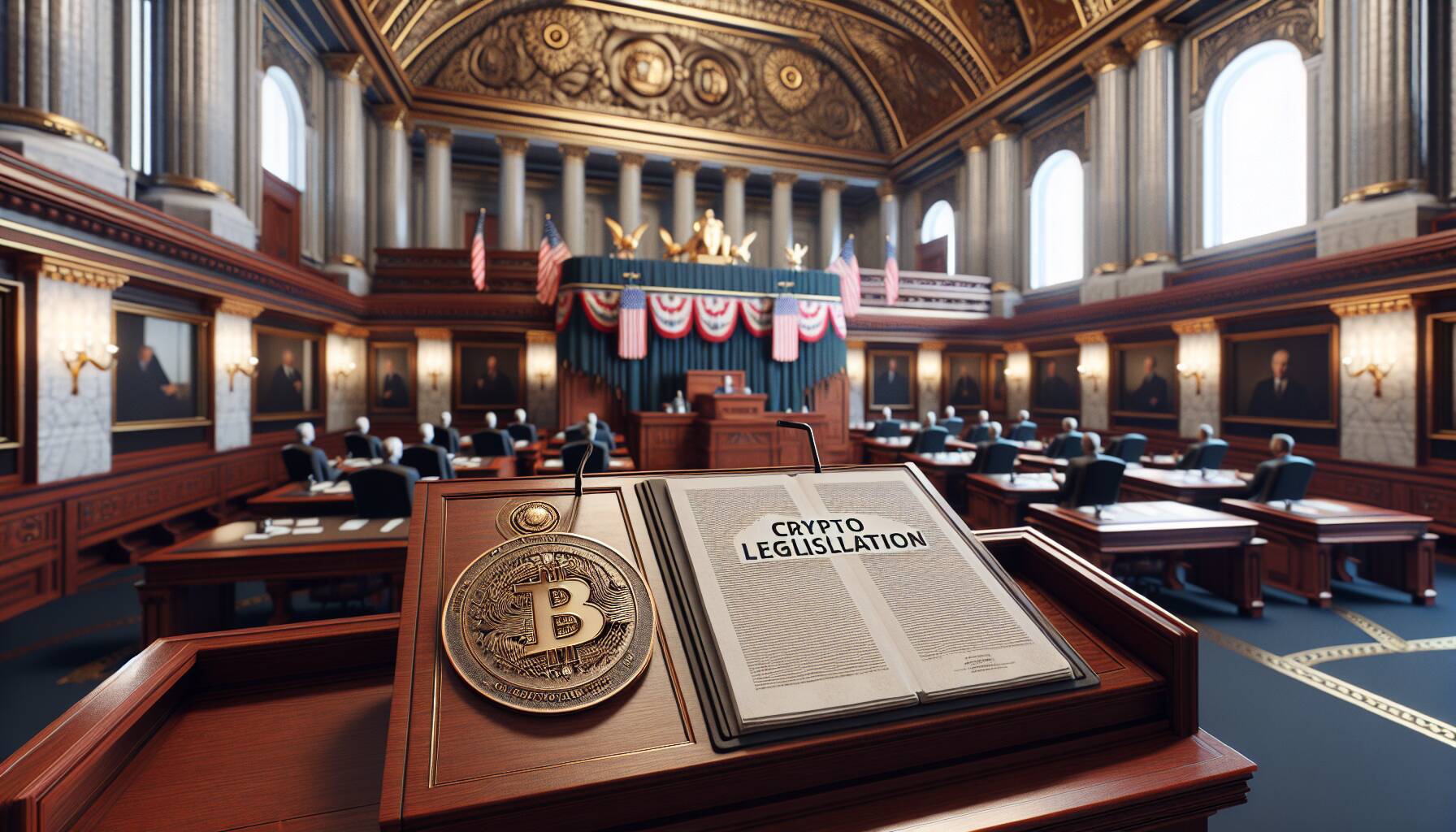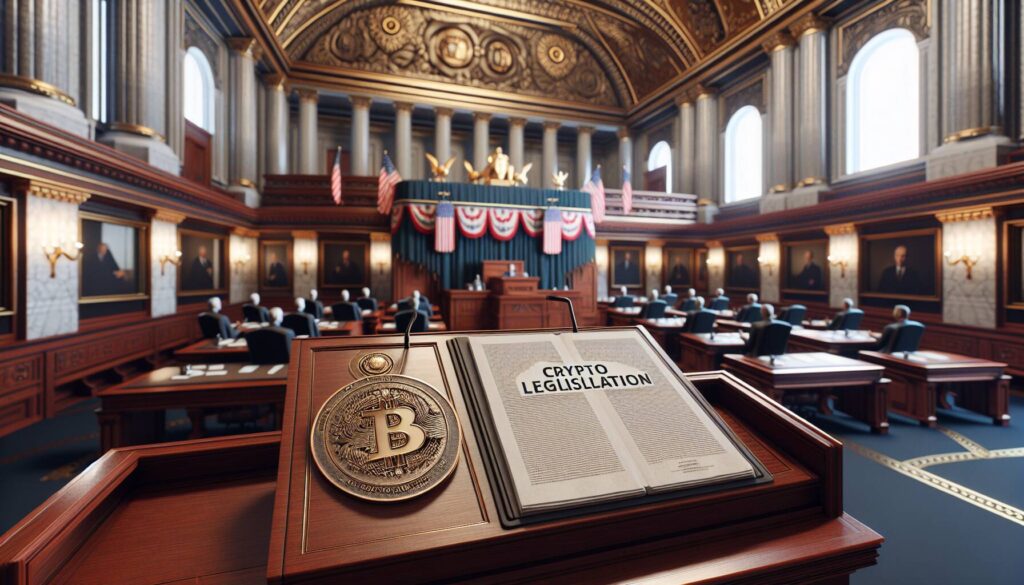In a notable development for the cryptocurrency sector, U.S. lawmakers are poised to bring key legislation closer to reality, with discussions and votes slated for the House of Representatives next week. Dubbed “Crypto Week,” this period could mark a significant turning point as the House prepares to vote on bills that address market structure, stablecoins, and even the prohibition of a central bank digital currency (CBDC).
Among the primary pieces of legislation are the “Digital Asset Market Clarity Act of 2025” and the “Guiding and Establishing National Innovation for U.S. Stablecoins of 2025” (GENIUS Act), both of which aim to provide essential regulatory clarity for the crypto industry. These bills could potentially receive bipartisan support, reflecting a concerted effort by lawmakers to craft a more favorable regulatory environment for cryptocurrencies.
The GENIUS Act, which has already passed in the Senate, would establish rules for stablecoins and could be the first major cryptocurrency bill to receive presidential approval. Meanwhile, the Digital Asset Market Clarity Act is designed to clarify how different cryptocurrencies will be treated by prominent regulatory bodies, including the Securities and Exchange Commission (SEC) and the Commodity Futures Trading Commission (CFTC).
The outcome of next week’s votes is significant, as the success of these bills may pave the way for a more organized framework governing cryptocurrencies, enabling businesses to navigate a clearer regulatory landscape. This clarity is something that the industry has long been advocating for, particularly after significant investments in political campaigns aimed at fostering a pro-crypto legislative environment.
However, the implications of these legislative efforts extend beyond regulatory clarity. Questions remain regarding how effectively stablecoins can compete against existing payment systems and whether the legislation could inadvertently lead to challenges, such as corruption, as raised by some lawmakers concerned about potential conflicts of interest.
“These bills serve as a brazen stamp of approval for the blatant abuse of power we’re witnessing in real time,” said Maxine Waters, Financial Services Committee Ranking Member.
As discussions unfold, the focus will also turn to the House Ways and Means Committee, which is scheduled to hold a hearing on crypto taxation. This week promises critical insights into the future of cryptocurrency regulation in the U.S. and its impact on the industry as a whole.

U.S. Crypto Legislation Update
Key points regarding the potential impact of upcoming legislation on the cryptocurrency industry in the U.S.
- House Voting Schedule:
- Vote on multiple bills set for July 14-18, termed “Crypto Week.”
- Includes the Digital Asset Market Clarity Act, Anti-CBDC Surveillance Act, and the GENIUS Act.
- Potential Legislative Wins:
- Passage of the stablecoin bill may lead to clearer regulations, a significant shift for the crypto industry.
- Legislation aims to provide “regulatory clarity” that could foster innovation and adoption.
- Impact on Stablecoins:
- GENIUS Act could establish a framework for stablecoin oversight.
- Stablecoins require compelling advantages to surpass existing payment systems, influencing their adoption rates.
- Bipartisan Support:
- All bills are expected to pass with bipartisan majorities, indicating political support for the crypto industry.
- This could lead to more favorable conditions for crypto businesses and investment opportunities.
- Concerns Raised:
- Democratic leaders express worries over potential corruption linked to crypto legislation.
- Concerns about the implications of regulation and its effects on public trust in the industry.
- Future Regulations:
- New regulations may take time to develop, but firms can expect clearer operational guidelines.
- This clarity could influence consumers’ trust and willingness to use crypto assets.
Analysis of Upcoming U.S. Crypto Legislation: Competitive Insights
The anticipated legislation concerning cryptocurrency in the U.S. represents a pivotal moment for the industry, likely setting a regulatory tone that could clarify many operational ambiguities. While the House of Representatives prepares to vote on multiple bills next week, the impact of these proposed changes presents a dual-edged sword.
On one hand, the potential passage of the Digital Asset Market Clarity Act of 2025 and the Guiding and Establishing National Innovation for U.S. Stablecoins of 2025 (GENIUS) could afford the crypto sector essential regulatory clarity. This clarity has been a long-standing demand of the industry, which could yield a more favorable environment for startups and established firms alike. Businesses like Circle and Coinbase, which are already at the forefront of crypto innovations, stand to benefit from clearer guidelines, potentially fostering more robust competition and expansion opportunities.
However, this momentum may not come without significant obstacles. Critics, particularly from the Democratic side, are voicing concerns that these bills might facilitate corruption, referring to potential conflicts of interest with Trump’s affiliations. Should skepticism surrounding regulatory practices increase, it may deter institutional investors and inhibit broader adoption among consumers wary of volatility and reputational risks in the cryptocurrency market.
Additionally, the bills’ provisions may limit how stablecoins operate. Stability in the volatile crypto market is vital for encouraging everyday usage, but as noted in reports by Moody’s Ratings, stablecoins must present clear advantages over existing payment systems to gain traction. Financial institutions like large banks could find themselves challenged by the introduction of well-regulated stablecoins, forcing them to innovate or adapt to maintain competitiveness. Conversely, smaller fintech startups might struggle against the compliance demands and potential costs that come with adhering to these new regulations.
As the voting procedure looms, the upcoming legislation shines a spotlight not only on the evolving regulatory framework but also on the varying advantages and disadvantages it poses to different stakeholders in the financial ecosystem. The benefits and challenges ahead signal that while regulatory advancements may pave the way for growth in the crypto space, they may also create friction with traditional financial institutions and heighten scrutiny of the broader implications of cryptocurrency legislation.















